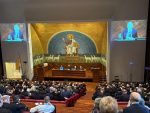By Matters India Reporter
New Delhi, Dec. 18, 2018: Life term awarded to a top political leader in the 1984 anti-Sikh riots case gives hope to victims of communal violence awaiting justice in India, say activists working among the survivors of the Odisha’s anti-Christian violence.
The verdict against Sajjan Kumar is a big day in the history of minority rights struggle in India, Tehmina Arora, a legal consultant for Alliance Defending Freedom (ADF) International, told Matters India on December 18, a day after the Delhi High Court sentenced the Congress leader to life for his role in the mass killing of Sikhs in 1984.
The court overturned his acquittal by a lower court in 2013 and described the massacre as a crime against humanity. It directed Kumar to surrender by December 31.
More than 2,700 Sikhs were killed in the week following the assassination of the then Prime Minister Indira Gandhi by Sikh guards on October 31, 1984.
A bench of justices S Muralidhar and Vinod Goel clarified that Kumar could not be given a lenient sentence for “abetting and instigating” people to kill Sikhs in the aftermath of the assassination and dubbed the killings as a “carnage of unbelievable proportions.”
The verdict “gives us hope that in near future the hate criminals of the 1992 demolition of the Babri Masjid, 2002 Gujarat genocide, Kandhamal violence in 2008, and other pogroms and genocides will be punished,” said Arora, a member of the Christian Legal Association who was given “Champion of Human Rights” award from the Minority Commission of the Delhi government on the same day of the verdict.
“I dedicate my award to those brave Sikh women and men who struggled for the justice in 1984 Sikh genocide,” said the lawyer practicing in the area of constitutional law and human rights with a special emphasis on minority rights and religious freedom.
She urged Christians and Muslims to learn from Sikhs who struggled for 34 years to get justice in the 1984 riot case. “They didn’t forget and forgive what happened with them and they don’t allow the nation to forget the brutal crimes of 1984,” Arora said and added and added, “They are inspiration. I salute them all.”
Muslims are still waiting for justice in the 1992 riots that killed more than 2000 people, mainly Muslims. The violence across the country was triggered by the demolition of an ancient mosque in the northern Indian town of Ayodhya. Two years later, more than 1,000 people, mostly Muslims, were killed in Gujarat riots lasting three days.
For Christians, the Kandhamal district in Odisha stage was the worst violence they faced in modern history. In 2008,. some 100 people, mostly Christians, were killed and nearly 56,000 were displaced in the violence that lasted months.
Veteran journalists John Dayal, another awardee by the Delhi Minority Commission, said it was significant that the Delhi High Court has in its verdict listed the Gujarat and Kandhamal riots as examples that challenge the criminal justice dispensation in India.
Anto Akkara, another journalist and awardee, wants Christian leaders to wake up and reopen the unacceptably high level of acquittals in the Kandhamal violence. Sikhs getting justice after 34 years gives hope to all minority communities, he added.









